E-commerce sites utilizing free unlimited web hosting often encounter significant scalability challenges that can impede growth and degrade user experience. Resource limitations and performance issues are common, making it crucial for businesses to proactively address these obstacles. By optimizing performance and employing strategies like caching and Content Delivery Networks, sites can better manage traffic and enhance reliability without incurring extra costs.
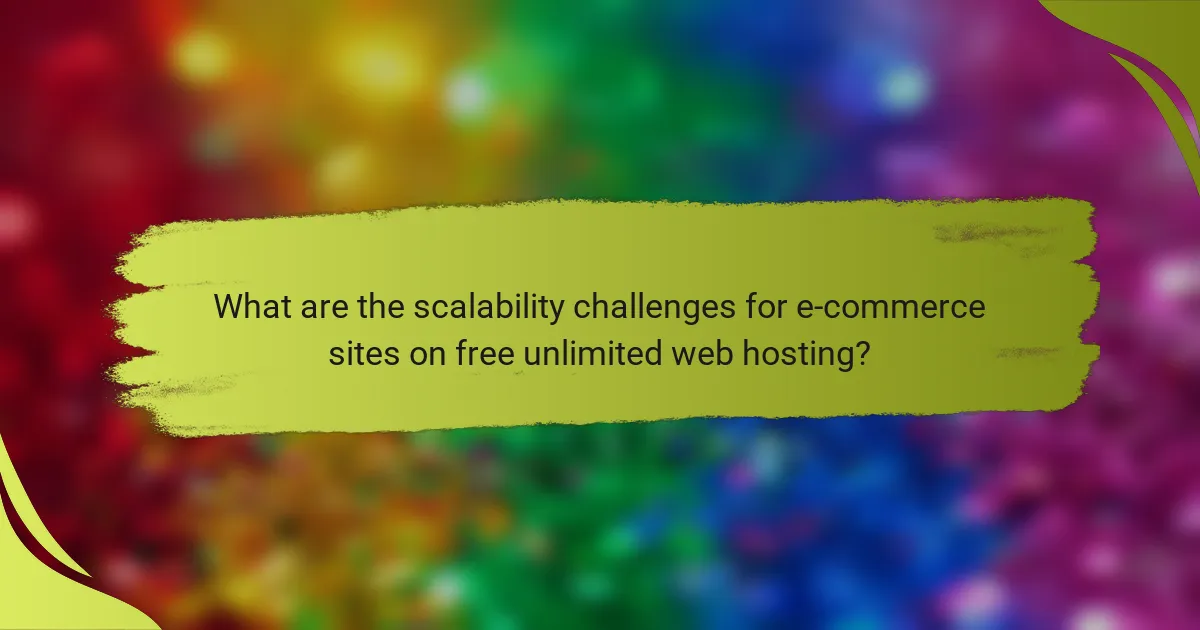
What are the scalability challenges for e-commerce sites on free unlimited web hosting?
E-commerce sites on free unlimited web hosting face significant scalability challenges, primarily due to resource limitations and performance issues. These challenges can hinder growth, affect user experience, and compromise security, making it essential for businesses to understand and address them effectively.
Limited server resources
Free unlimited web hosting often comes with restricted server resources, such as CPU power, memory, and bandwidth. This limitation can lead to slow loading times and downtime during peak traffic periods, which are critical for e-commerce operations.
To mitigate these issues, consider monitoring your site’s resource usage regularly. If you notice consistent spikes, it may be time to upgrade to a paid hosting plan that offers dedicated resources to support your growing business.
Performance bottlenecks
Performance bottlenecks are common in free hosting environments due to shared resources among multiple users. This can result in slower page load times, which negatively impacts user experience and conversion rates.
To enhance performance, optimize images and leverage caching techniques. Implementing a content delivery network (CDN) can also help distribute traffic and reduce load times, especially for international customers.
Security vulnerabilities
Free unlimited web hosting services often lack robust security measures, making e-commerce sites more susceptible to cyber threats. Without proper security protocols, sensitive customer information, such as payment details, can be at risk.
To protect your site, use SSL certificates and regularly update your software and plugins. Additionally, consider investing in a security service that offers malware scanning and removal to safeguard your e-commerce platform.
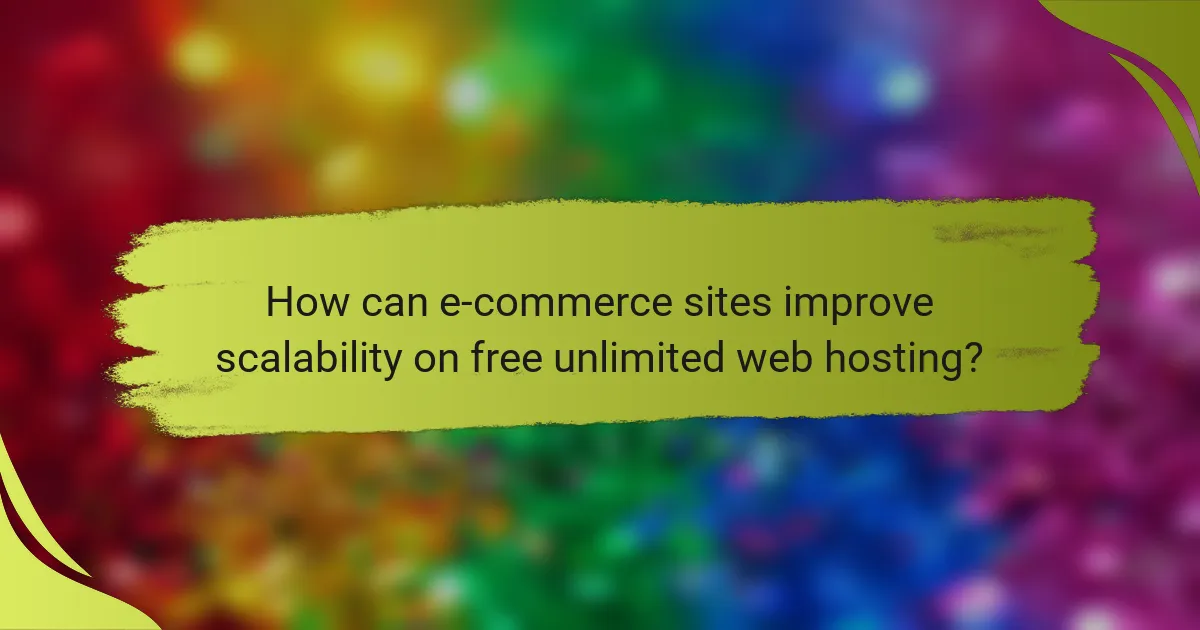
How can e-commerce sites improve scalability on free unlimited web hosting?
E-commerce sites can enhance scalability on free unlimited web hosting by optimizing performance, implementing caching solutions, and utilizing Content Delivery Networks (CDNs). These strategies help manage increased traffic and improve load times, ensuring a better user experience without incurring additional costs.
Optimize website performance
Improving website performance is crucial for scalability, especially on free hosting platforms. Focus on minimizing image sizes, reducing HTTP requests, and streamlining code to enhance loading speeds. Tools like Google PageSpeed Insights can provide actionable recommendations to boost performance.
Consider using lightweight themes and plugins that do not overload the server. Regularly audit your website to identify and eliminate any unnecessary elements that could slow down your site.
Implement caching solutions
Caching solutions store frequently accessed data to reduce server load and speed up page delivery. For e-commerce sites, implementing browser caching can significantly improve user experience by allowing returning visitors to load pages faster. Use caching plugins compatible with your hosting environment to simplify this process.
Be mindful of cache expiration settings to ensure that users receive the most up-to-date content. Regularly review and clear cache to prevent outdated information from being displayed.
Use Content Delivery Networks (CDNs)
CDNs distribute your website’s content across multiple servers worldwide, allowing users to access data from a location closer to them. This reduces latency and improves load times, which is vital for e-commerce sites experiencing high traffic volumes. Many CDNs offer free tiers that can be beneficial for sites on budget hosting plans.
Integrating a CDN can also help manage sudden traffic spikes during sales or promotions, ensuring that your site remains accessible. Evaluate CDN options based on their global reach and compatibility with your existing hosting setup to maximize benefits.
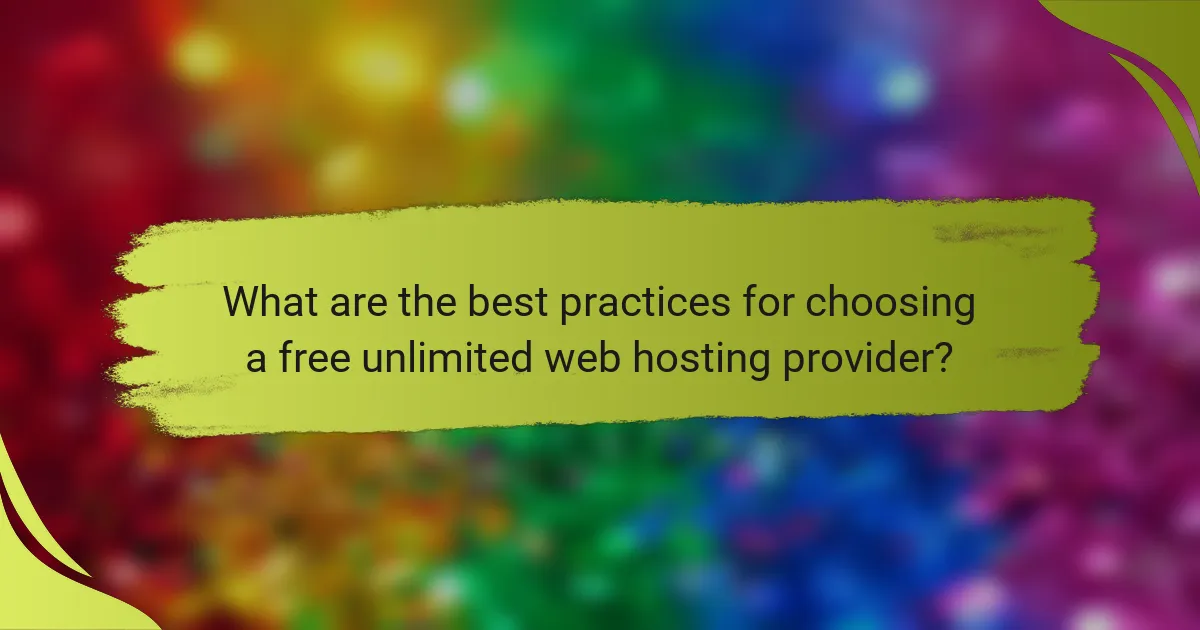
What are the best practices for choosing a free unlimited web hosting provider?
Choosing a free unlimited web hosting provider requires careful consideration of several key factors to ensure your e-commerce site remains reliable and efficient. Focus on uptime, customer support, and bandwidth limitations to make an informed decision.
Evaluate uptime guarantees
Uptime guarantees are crucial for e-commerce sites, as downtime can lead to lost sales and damaged reputation. Look for providers that offer at least a 99% uptime guarantee, which translates to no more than a few hours of downtime per year.
Consider reading user reviews and checking third-party monitoring services to verify these claims. A provider with a solid track record of uptime is essential for maintaining customer trust and ensuring smooth transactions.
Check customer support options
Reliable customer support is vital when issues arise with your hosting service. Ensure the provider offers multiple support channels, such as live chat, email, and phone support, ideally available 24/7.
Test their response times and quality of assistance before committing. A provider with responsive support can help you resolve issues quickly, minimizing potential disruptions to your e-commerce operations.
Assess bandwidth limitations
Even with “unlimited” hosting, there may be hidden bandwidth limitations that can affect your e-commerce site during peak traffic times. Review the provider’s terms of service to understand any fair usage policies that may apply.
Consider your expected traffic levels and choose a provider that can accommodate your needs without throttling your connection. This ensures that your site remains accessible and performs well, even during busy shopping periods.
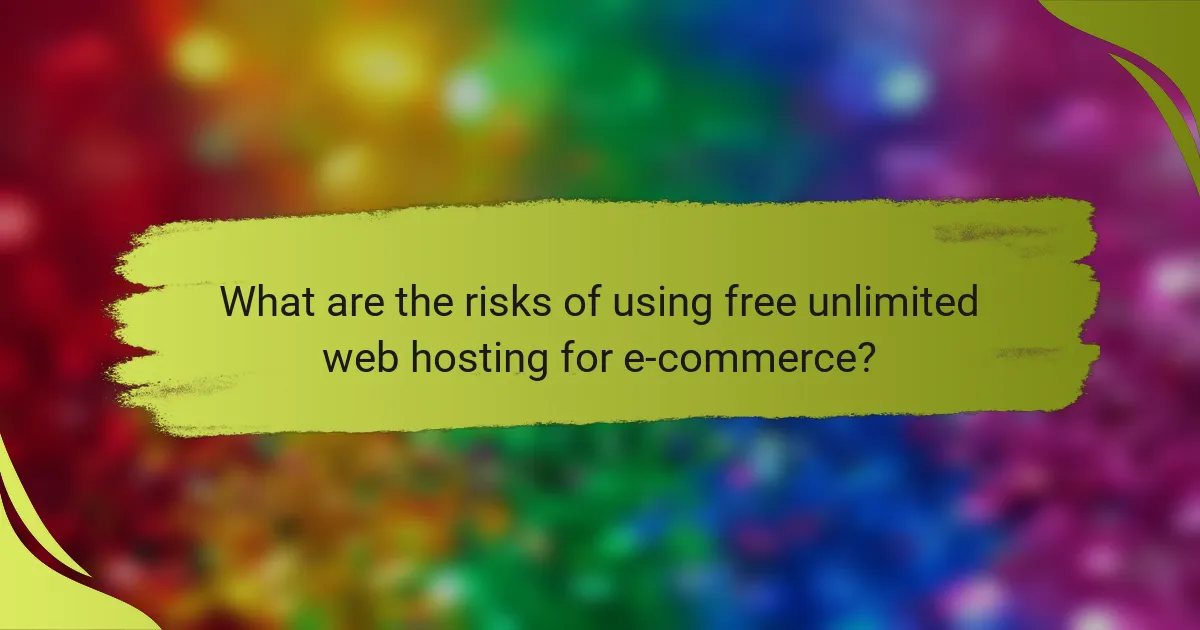
What are the risks of using free unlimited web hosting for e-commerce?
Using free unlimited web hosting for e-commerce can expose your business to significant risks, including data loss and limited scalability. These factors can hinder your ability to grow and maintain a reliable online store, ultimately affecting customer trust and sales.
Data loss potential
Free unlimited web hosting often lacks robust backup solutions, increasing the risk of data loss. If the hosting provider experiences technical issues or goes offline, your website data may be irretrievably lost, impacting your inventory and customer information.
To mitigate this risk, consider implementing your own backup strategy. Regularly export your website data and store it securely, either on a local server or a cloud storage service. This practice can help you recover quickly in case of a hosting failure.
Limited scalability options
Free unlimited web hosting typically offers limited scalability options, which can be a major drawback for growing e-commerce businesses. As your traffic increases, you may encounter performance issues, such as slow loading times or downtime, which can deter potential customers.
To ensure your e-commerce site can handle growth, evaluate hosting providers that offer scalable plans. Look for options that allow you to easily upgrade resources, such as bandwidth and storage, as your business expands. This proactive approach can help maintain a positive user experience and support sales growth.
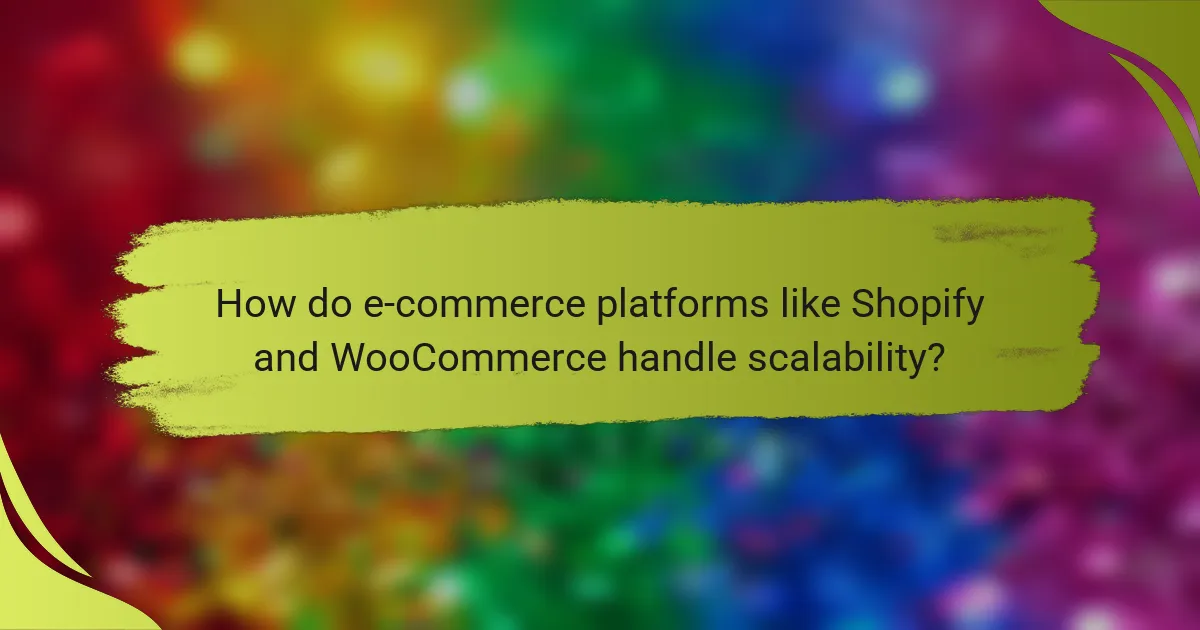
How do e-commerce platforms like Shopify and WooCommerce handle scalability?
E-commerce platforms such as Shopify and WooCommerce manage scalability through a combination of built-in features and third-party integrations. These solutions allow businesses to grow without significant disruptions, ensuring that their online stores can handle increased traffic and transactions efficiently.
Built-in scalability features
Shopify and WooCommerce come equipped with various built-in scalability features that help businesses adapt to changing demands. For instance, Shopify offers a robust infrastructure that can automatically adjust to traffic spikes, ensuring minimal downtime during peak shopping seasons.
WooCommerce, being a plugin for WordPress, leverages the scalability of the WordPress ecosystem. Users can optimize their sites with caching plugins and content delivery networks (CDNs) to enhance performance. However, the effectiveness of these features often depends on the hosting environment, so selecting a reliable hosting provider is crucial.
Third-party integrations
Both platforms support numerous third-party integrations that enhance scalability. For example, Shopify’s app store includes tools for inventory management, customer relationship management (CRM), and analytics, which can help streamline operations as businesses grow.
WooCommerce users can take advantage of various plugins that facilitate scaling, such as those for payment processing and shipping logistics. When choosing integrations, it’s essential to consider compatibility and performance impact, as poorly optimized plugins can slow down the site and negate scalability benefits.
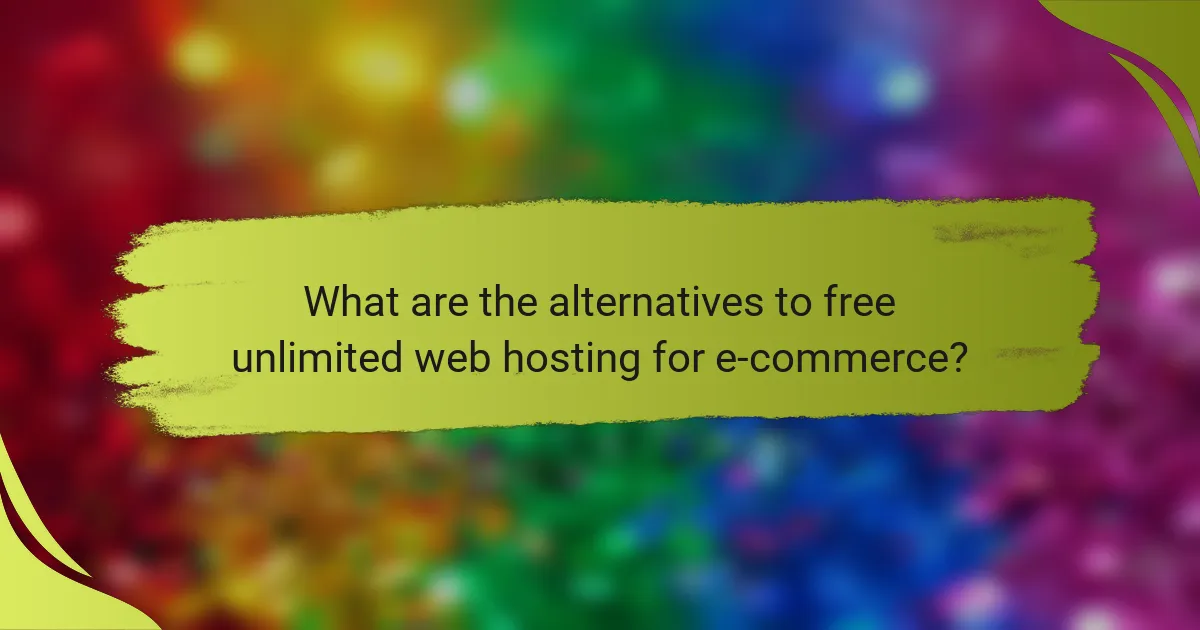
What are the alternatives to free unlimited web hosting for e-commerce?
Alternatives to free unlimited web hosting for e-commerce include paid hosting services, cloud hosting, and dedicated servers. These options provide better performance, security, and scalability, which are essential for online stores to thrive.
Paid Hosting Services
Paid hosting services typically offer a range of plans tailored to e-commerce needs. These services often include features like SSL certificates, faster loading times, and dedicated customer support. Prices can vary widely, generally starting from around $5 to $30 per month, depending on the features and resources required.
When choosing a paid hosting service, consider factors such as bandwidth, storage, and the number of websites allowed. Look for providers that offer scalability options, allowing you to upgrade your plan as your business grows.
Cloud Hosting
Cloud hosting utilizes multiple servers to host your website, providing flexibility and reliability. This option is particularly beneficial for e-commerce sites experiencing fluctuating traffic, as resources can be adjusted dynamically. Pricing for cloud hosting often starts at approximately $10 per month but can increase based on usage.
One advantage of cloud hosting is its ability to handle high traffic volumes without downtime. However, it’s essential to monitor costs, as they can escalate with increased resource usage. Choose a cloud provider that offers transparent pricing and billing practices.
Dedicated Servers
Dedicated servers provide an entire server for your e-commerce site, ensuring optimal performance and security. This option is ideal for larger businesses or those with high traffic, as it allows complete control over server resources. Costs typically range from $80 to several hundred dollars per month, depending on server specifications.
While dedicated servers offer significant advantages, they require more technical knowledge to manage effectively. Businesses should weigh the benefits against the need for IT expertise and consider managed services if they lack in-house capabilities.
